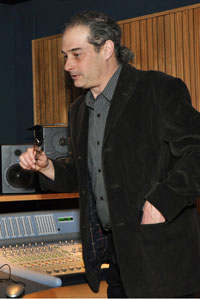
Phil Farnsworth
Steve MacLean
For media inquiries, please contact Media Relations
Steve MacLean is an assistant professor in the Electronic Production and Design Department at Berklee College of Music. A guitarist, composer, producer, and engineer, he has been evolving with music technology since the early 1980s, when he worked in a New York City recording studio and got hands-on experience with early versions of the Fairlight CMI, DX-7, Linn Drum, automated mixing consoles, and digital audio samplers. Later, he founded his own recording and production studio and produced/engineered hundreds of artists and numerous award-winning projects including scores for more than 200 commercials and soundtracks, as well as a prolific output of his own acclaimed works.
An active performer and composer for more than 30 years, he was cofounder of the Portland Experimental Music Collective, has performed original compositions at numerous new music festivals, including several pieces for New Music Across America and similar events. An innovator in the new music circuit, he was curator for a series of concerts called 2001 New Music Odyssey, and continues to release recordings internationally on Recommended Records, U.K., and others.
MacLean has been a music technology educator independently and with Berklee. He also was a product specialist/clinician with a variety of manufacturers for more than 20 years.
- Electric and electronic guitar
- Leader, Steve MacLean Ensemble
- Member, Smacdada
- Appearances with Chris Cutler, Nick Didkovsky, Mercy, Roswell Rudd, Smacdada, and Steve MacLean Ensemble
- Recordings include The Opposite of War, Radial Circuit, Flies in the Face of Logic, and Holomovement
